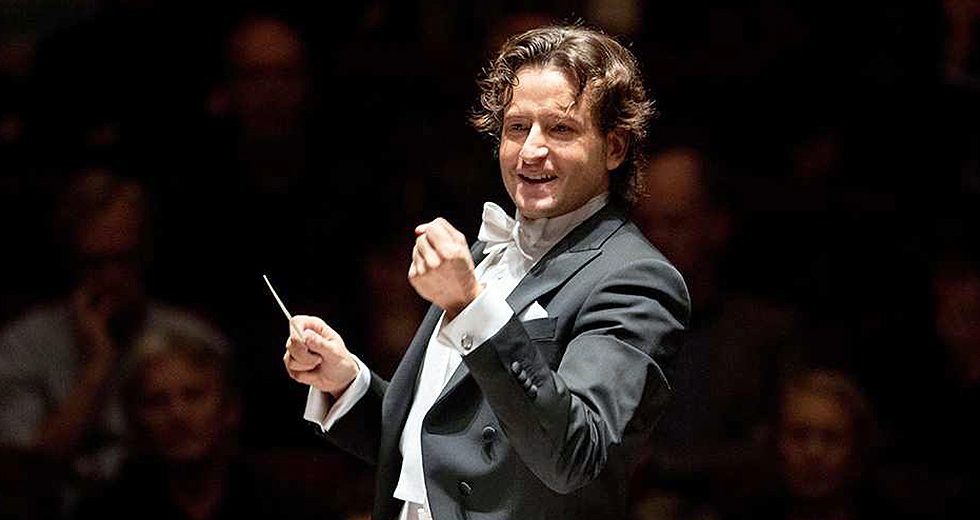
For up-and-coming conductors, debuts with major orchestras are critical career milestones. If all goes well and they pass muster with musicians, audiences and critics, such outings can lead to future concerts with those orchestras and even valuable ongoing relationships. These engagements also can bring valuable attention that can generate additional jobs with other high-profile ensembles.
“Having debuts with different orchestras and on different continents is very helpful for further chances, that’s for sure,” said Gustavo Gimeno, one of four conductors who will make debuts with the Chicago Symphony Orchestra this summer at the Ravinia Festival. The fast-rising Spanish maestro will appear with the orchestra on Aug. 2, with guest pianist Garrick Ohlsson (replacing Daniil Trifonov, who had to cancel due to an ear infection).
Also making their CSO podium bows will be:
- July 26, Ben Gernon, the 2013 winner of the internationally recognized Nestlé and Salzburg Festival Young Conductors Award.
- Aug. 5, Kirill Karabits, chief conductor of England’s Bournemouth Symphony Orchestra since 2009.
- Aug. 12, George Hanson, who stepped down in 2015 after 20 years as music director of the Tucson (Ariz.) Symphony Orchestra.
Gimeno followed a somewhat unusual path to becoming a conductor. While it’s not so uncommon for instrumentalists to switch to conducting, they often come from the string ranks, like violinists Pinchas Zukerman or Peter Oundjian, who have built equally or almost equally important careers on the podium. Gimeno, however, served as principal percussionist of Amsterdam’s famed Royal Concertgebouw Orchestra before switching to conducting and serving as an assistant to the Concertgebouw’s then-music director, Mariss Jansons. He also received mentoring from Bernard Haitink, a former music director of the Concertgebouw, and Claudio Abbado, who died in 2014. “I was very close with Abbado for the last year of his life,” Gimeno said. “I had a very intense relationship with him.”
The percussionist resigned his position in the Concertgebouw Orchestra in 2013, and his conducting career took off in February 2014, when he stepped in at the Concertbouw as a replacement for an ailing Jansons. Often in such situations, substitute conductors change the scheduled program, but Gimeno stuck with Jansons’ original lineup, which included the just the second set of performances anywhere of Magnus Lindberg’s Second Piano Concerto. Three months later, Gimeno was called upon for another high-profile substitution, filling in for Lorin Maazel and leading a tour with the Munich Philharmonic, an ensemble with which he has since maintained a close relationship.
In 2015-16, the maestro took over as music director of the Orchestre Philharmonique du Luxembourg, an ensemble he describes as well-managed and financially sound. “There are many special ingredients about it,” he said. “One, there is a wonderful concert hall, the Philharmonie. It’s a modern hall that has existed only 10 years, and it has become one of the most important venues in Europe. Every orchestra has come here, including the Chicago Symphony and many others. The orchestra is an eager orchestra, which is willing to develop like me, so that’s very good, and we are enjoying this first season together.”
While conducting is a relatively recent development for Gimeno, it has interested him since childhood. “I remember listening to the music my father would play,” he said. “I remember, for example, the First Symphony of Mahler. Of course, I couldn’t read any notes, but I got very excited with the last movement, and I stood up and tried to move and express myself as a conductor. So that was probably always in mind.”
But he never gave much serious thought to the profession until he landed his instrumental position in the Concertgebouw Orchestra and had the kind of occupational security that allowed him to start thinking about other musical avenues he might want to pursue.
When Gimeno is standing before an orchestra for the first time, he always runs through at least one full movement of a work before he says anything, relying instead on gestures and facial expressions to communicate with the players. That allows him to establish a basic rapport with the musicians before he makes his first comments, which can set the tone for rest of the collaboration.
Gimeno’s program for his CSO debut will feature veteran pianist and Chicago favorite Garrick Ohlsson in Beethoven’s Piano Concerto No. 5 (Emperor). Also featured will be Dvořák’s beloved Symphony No. 9, From the New World; the previously announced overture to Weber’s opera Der Freischütz has been dropped to accommodate the Beethoven concerto. Of course, a great orchestra like the CSO knows these pieces very well, especially the New World Symphony. “So that’s a challenge,” he said. “I hope there is something I can still bring to the interpretation.”
Kyle MacMillan, formerly the classical music critic of the Denver Post, is a Chicago-based arts journalist.